Keeping our bodies hydrated is vital, especially when we’re exercising. With many choices out there, it’s smart to ask: is water vs. sports drinks better for keeping us hydrated?
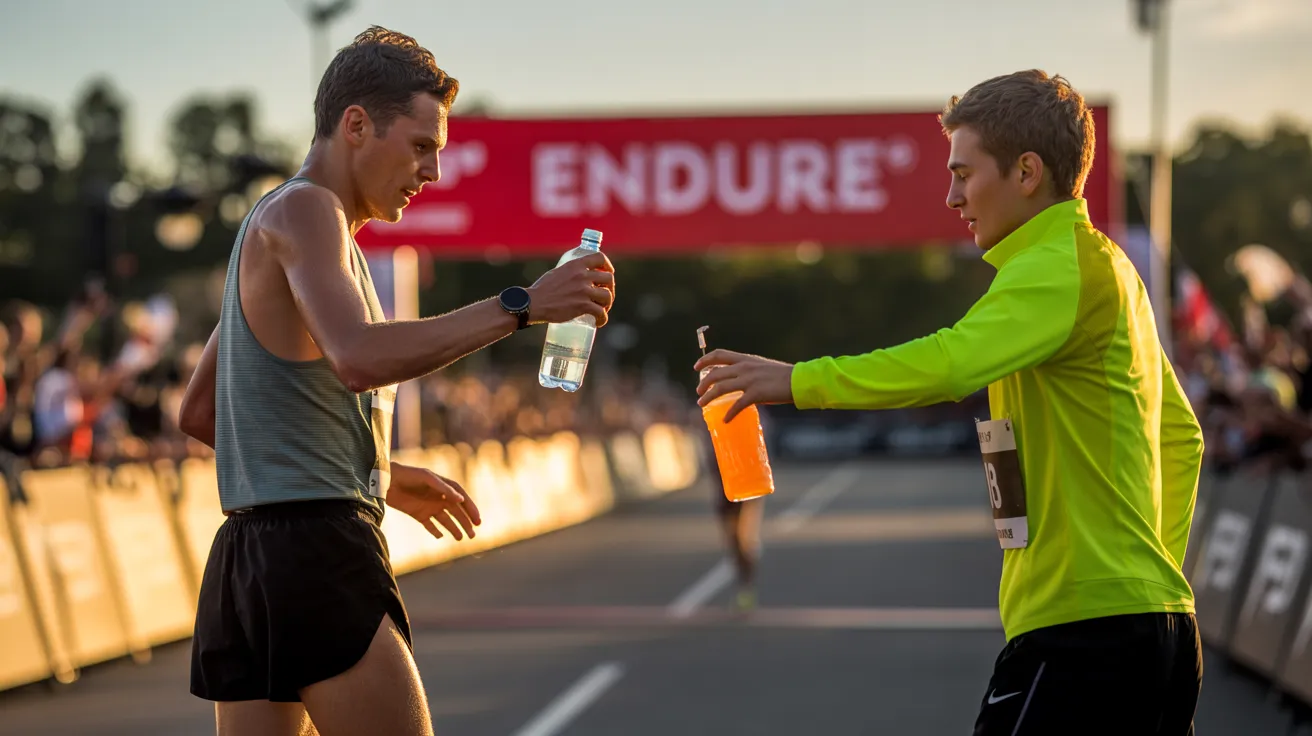
If you’re into fitness regularly, knowing about hydration is important. Water works well for light activities. But for long or intense exercise, sports drinks might give you extra benefits.
This article will dive into the differences between water and sports drinks. We’ll help you decide which is best for your hydration needs.
👉 Elevate your hydration game with the 🛒 Ninja Thirsti Drink System – a powerful soda maker that lets you personalize your sparkling & still drinks with adjustable size, flavor, and carbonation! 🥤✨ Includes a 60L CO2 cylinder & flavored water drops for ultimate refreshment.
Key Takeaways
- Understanding the importance of hydration for the body.
- The role of water in hydration during low-intensity activities.
- The benefits of sports drinks during high-intensity or prolonged exercise.
- Factors to consider when choosing between water and sports drinks.
- Tips for staying hydrated during fitness routines.
The Basics of Hydration
Understanding hydration is key for good health. It helps with body temperature, nutrient transport, and waste removal.
Why Proper Hydration Matters
Hydration keeps energy and performance up. Even a little dehydration can make you tired and dizzy. Drinking water boosts focus and memory. As Leonardo da Vinci said, “Water is the driving force of all nature.“
Signs of Dehydration
Knowing dehydration signs is important. Look out for:
- Dark yellow or brown urine
- Dry mouth and throat
- Headaches and dizziness
- Fatigue and lethargy
Severe dehydration can cause heatstroke.
Daily Hydration Requirements
Hydration needs change with age, sex, weight, and activity. Drinking eight glasses a day is a good start.
Dr. Andrew Weil said,
💡 There’s no single, specific recommendation for daily water intake that applies to everyone. It’s best to drink when you feel thirsty.
Understanding Water as a Hydration Source
Water is key for keeping our bodies working right. It helps control our body temperature, moves nutrients, and gets rid of waste.
Composition and Natural Benefits
Water is made of hydrogen and oxygen atoms. It’s good because it has no calories, is cheap, and easy to find. Drinking enough water can make our brains work better, help us perform sports better, and aid in losing weight.
Sports Drink vs Water YouTube Video
How Water Hydrates the Body
Water gets into our blood, helping keep our body fluids balanced. It’s a complex process that makes sure our cells get the water they need.
Recommended Daily Water Intake
How much water we should drink daily changes. Adults usually need 8-10 cups (64-80 ounces) a day.
Factors Affecting Individual Needs
Our water needs can change based on our age, sex, weight, how active we are, and where we live. For example, athletes or people in hot places might need more water.
Tracking Your Water Consumption
To make sure you drink enough water, you can use a water bottle or a mobile app. Setting reminders or making water taste better by adding lemon or lime can help you drink more.
The Science Behind Sports Drinks
Sports drinks are made with science in mind. They’re designed to meet specific needs during exercise. These drinks do more than just hydrate; they also replace lost electrolytes, give energy, and boost performance.
Common Ingredients and Their Functions
Sports drinks have different ingredients for various reasons. The main parts include:
Carbohydrates
Carbohydrates are key for energy during workouts. Sports drinks use simple carbs like glucose or fructose. These carbs are quickly used by muscles.
Electrolytes
Electrolytes like sodium and potassium are lost in sweat. Replacing them is crucial for staying hydrated and avoiding cramps. Sports drinks help keep electrolyte levels balanced.
Flavorings and Colorings
Flavorings and colorings make sports drinks taste better. They encourage athletes to drink more, staying hydrated.
How Sports Drinks Work in the Body
When we drink sports drinks, they get absorbed into our blood. They help replace lost fluids, electrolytes, and energy. This keeps us hydrated and supports our physical performance.
Categories of Sports Drinks
Sports drinks fall into three main types based on their solute concentration:
Isotonic Drinks
Isotonic drinks match the body’s fluid concentration. They’re absorbed quickly, providing fast hydration.
Hypotonic Drinks
Hypotonic drinks are less concentrated. They offer hydration but not much energy.
Hypertonic Drinks
Hypertonic drinks have more solutes. They’re mainly for energy replenishment, not hydration.
Knowing these categories helps athletes pick the best sports drink. It boosts their performance and hydration.
Water vs. Sports Drinks: The Key Differences
It’s important to know the difference between water and sports drinks for good hydration. Both help us stay hydrated, but they are not the same. They have different ingredients and uses.
Absorption Rate Comparison
Water is absorbed fast by our bodies, making it great for daily hydration. Sports drinks, with their extra ingredients, take a bit longer to absorb. But, this can help during long activities when we need more energy.
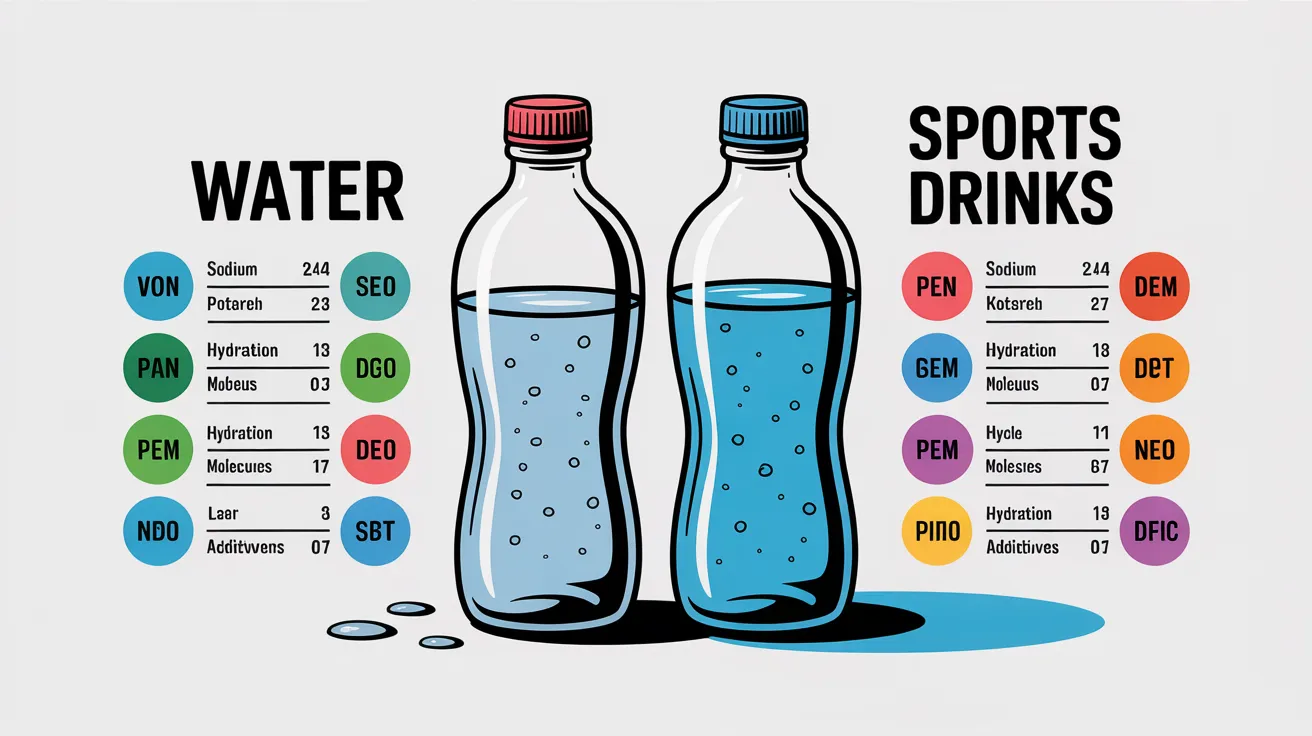
Hydration Efficiency
Water and sports drinks both hydrate well, but in different ways. Water is perfect for light activities. Sports drinks are better for intense, long activities because they replace lost electrolytes.
Caloric Content
Water has no calories, which is good for those watching their diet. Sports drinks, however, have calories from carbs. They help with energy during hard activities but can lead to weight gain if too much is drunk.
Taste and Palatability Factors
Water and sports drinks also differ in taste. Sports drinks come in many flavors, making exercise more enjoyable. Water can be made tastier with lemon or lime slices.
In summary, choosing between water and sports drinks depends on your activity level, how long you’re active, and your taste and calorie preferences. Knowing these differences helps us make better choices for staying hydrated.
Electrolytes: Understanding Their Role
Electrolytes are minerals that carry an electric charge. They help regulate many bodily functions, like hydration. They keep fluids balanced, control nerve and muscle functions, and help maintain a healthy pH balance.
What Are Electrolytes?
Electrolytes include minerals like sodium, potassium, calcium, and magnesium. These minerals are key for muscle contractions, nerve impulses, and staying hydrated. When we sweat, we lose these minerals, which can upset the body’s balance.
Electrolyte Content Comparison
Water has almost no electrolytes, but sports drinks have more. Sports drinks help replace lost electrolytes, especially for athletes in intense activities.
| Drink Type | Sodium (mg/L) | Potassium (mg/L) | Calcium (mg/L) |
|---|---|---|---|
| Water | 0-10 | 0-5 | 0-5 |
| Sports Drink | 400-1100 | 100-300 | 0-100 |
When Electrolyte Replacement Becomes Crucial
Electrolyte replacement is key during and after intense exercise, especially in hot weather. The more you exercise, the more electrolytes you lose through sweat.
Sweat Rate Considerations
People who sweat a lot lose more electrolytes. They might need to replace them during exercise. Watching your sweat rate can help figure out if you need more electrolytes.
Exercise Duration Thresholds
For workouts under 60 minutes, water is enough. But for longer activities, sports drinks with electrolytes can help replace lost minerals.
In conclusion, knowing about electrolytes and their role in hydration is crucial. It helps improve performance and keeps you healthy. Recognizing when you need electrolyte replacement helps you stay hydrated.
Choosing Between Water vs. Sports Drinks for Different Activities
Deciding between water and sports drinks for hydration depends on the activity’s type and intensity. Different exercises have unique hydration needs. Choosing the right fluid can greatly affect performance and recovery.
Casual Exercise (Under 60 Minutes)
For activities lasting under 60 minutes, like light jogging or yoga, water is enough. It replenishes lost fluids without adding calories or sugars.
Intense Workouts (60+ Minutes)
For workouts over 60 minutes, sports drinks are better. They replace lost electrolytes like sodium and potassium. These are key for hydration and nerve function. Sports drinks also give energy through carbohydrates.
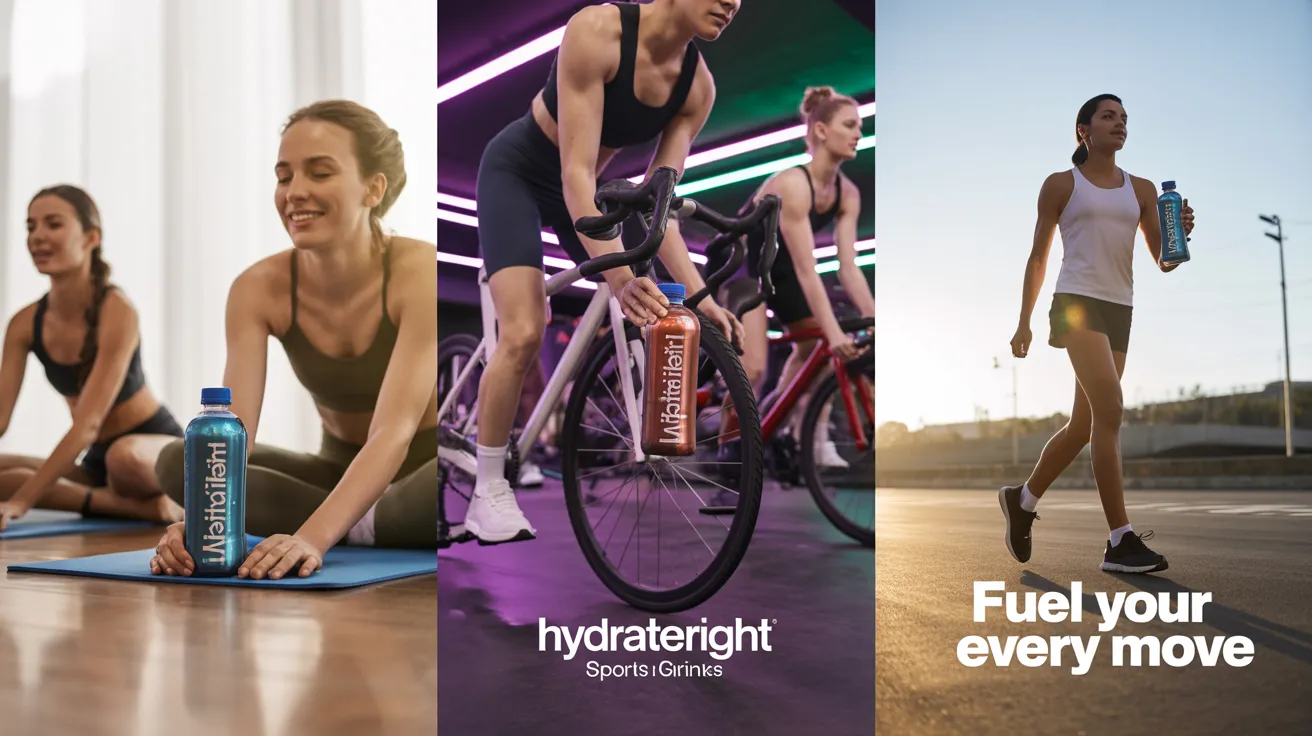
Endurance Events and Competitions
In endurance events, like marathons or long swims, sports drinks are recommended. They provide sustained energy and replace electrolytes over time. This helps keep hydration levels up and delays fatigue.
Daily Hydration Strategies
For daily hydration, especially for those not doing intense activities, water is best. It’s calorie-free and keeps fluid balance right. But, those who are very active or live in hot places might need sports drinks on some days.
Recovery Hydration
After intense or long activities, rehydrating is key. A mix of water and sports drinks is good for recovery. Water rehydrates the body, while sports drinks replace lost electrolytes.
| Activity Type | Recommended Hydration | Reason |
|---|---|---|
| Casual Exercise | Water | Effective for short, low-intensity activities |
| Intense Workouts | Sports Drinks | Replaces lost electrolytes and provides energy |
| Endurance Events | Sports Drinks | Maintains hydration and delays fatigue |
| Daily Hydration | Water | Calorie-free and effective for general hydration |
| Recovery Hydration | Water and Sports Drinks | Rehydrates and replenishes electrolytes |
The Sugar Factor: Health Implications
Many sports drinks are full of sugars that can harm your health if you drink too much. The high sugar in these drinks is something to watch out for, especially if you’re not very active.
Sugar Content in Popular Sports Drinks
Popular sports drinks have a lot of sugar. For example, one serving of a well-known brand can have up to 21 grams of sugar. That’s a lot, especially when you think about how much sugar you should have in a day.
Impact on Weight Management
Drinking sports drinks with lots of sugar can make you eat more calories. This can make it harder to manage your weight. Too much sugar can also lead to weight gain and obesity, which can cause more health problems.
Blood Sugar Considerations
If you have diabetes or are sensitive to sugar, sports drinks with a lot of sugar can cause blood sugar spikes. It’s important for these people to keep an eye on how much sugar they’re eating.
Sugar-Free and Low-Sugar Alternatives
Because of health worries, many sports drinks now come in sugar-free or low-sugar versions. These drinks use artificial sweeteners or natural alternatives to cut down on sugar.
Artificial Sweeteners: Pros and Cons
Artificial sweeteners taste sweet but don’t have calories. But, some studies say they might not be good for your health. It’s important to think about the good and bad sides.
Natural Alternatives
Natural sweeteners like stevia or monk fruit taste sweet but don’t have calories or the health risks of artificial sweeteners. They are getting more popular with people who care about their health.
| Sports Drink | Sugar Content (per serving) | Low-Sugar Alternative |
|---|---|---|
| Gatorade | 21g | Gatorade G2 |
| Powerade | 19g | Powerade Zero |
Special Populations: Who Benefits Most from Each Option
Special groups like athletes, kids, older adults, and those with health issues have unique hydration needs. Knowing these needs is key to staying hydrated and healthy.
Athletes and Fitness Enthusiasts
Athletes and those who love to stay active need sports drinks for intense workouts. They help replace lost salts and keep you hydrated. This can boost your performance and prevent dehydration.
Children and Adolescents
For kids and teens doing light exercise, water is enough. But during hard or long workouts, sports drinks can help replace lost salts.
Older Adults
Older folks are more at risk of dehydration because they don’t feel thirsty as much. They should drink water, but sports drinks might be good in hot weather or during long activities.
People with Certain Medical Conditions
Some health issues need special care with hydration. For example, those with diabetes, kidney disease, or high blood pressure must watch their fluid and salt intake.
Diabetes
People with diabetes should stick to water to avoid too much sugar. Sports drinks are okay during hard exercise, but they must watch their blood sugar.
Kidney Disease
Those with kidney disease should avoid too many salts in sports drinks. Water is safer, but they should talk to a doctor for advice.
Hypertension
People with high blood pressure should watch the sodium in sports drinks. Water is safer, but sports drinks might be needed during long activities with careful sodium watching.
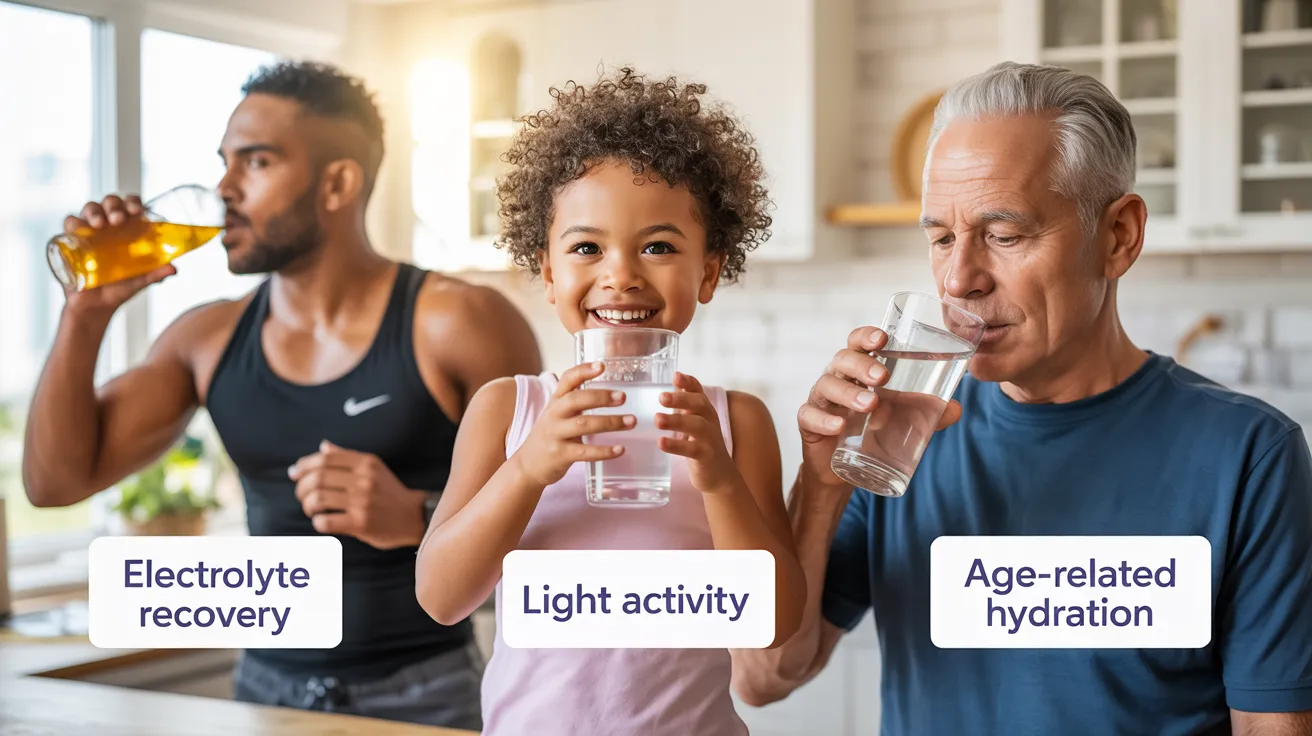
In summary, knowing the hydration needs of different groups is crucial. By understanding these needs, everyone can make the best choice for staying hydrated and healthy.
DIY Hydration: Creating Your Own Sports Drinks
With just a few basic ingredients, you can make your own sports drinks. They’re tailored to your hydration needs. Making your own sports drinks is simple and ensures you get the electrolytes you need. You won’t have to worry about added sugars or artificial ingredients.
Simple Homemade Electrolyte Recipes
One easy recipe mixes 1/2 cup of water, 1/4 cup of fruit juice (like orange or grapefruit), and 1/4 teaspoon of salt. This mix gives you essential electrolytes and carbs for energy. You can tweak the ingredients to fit your taste and activity level.
Customizing for Your Specific Needs
To make your sports drink your own, think about what you need. For intense workouts, you might want more electrolytes like sodium and potassium. Adding a banana or coconut water can help boost potassium.
Cost and Health Benefits
Making your own sports drinks is cost-effective and healthier than store-bought ones. Natural ingredients mean no added sugars or artificial flavors. It’s a healthier choice for your body.
Storage and Shelf Life
Keep your homemade sports drinks in the fridge. They’re best consumed within 24 to 48 hours. This keeps them fresh and effective. Always check for spoilage before drinking.
Making the Right Hydration Choice
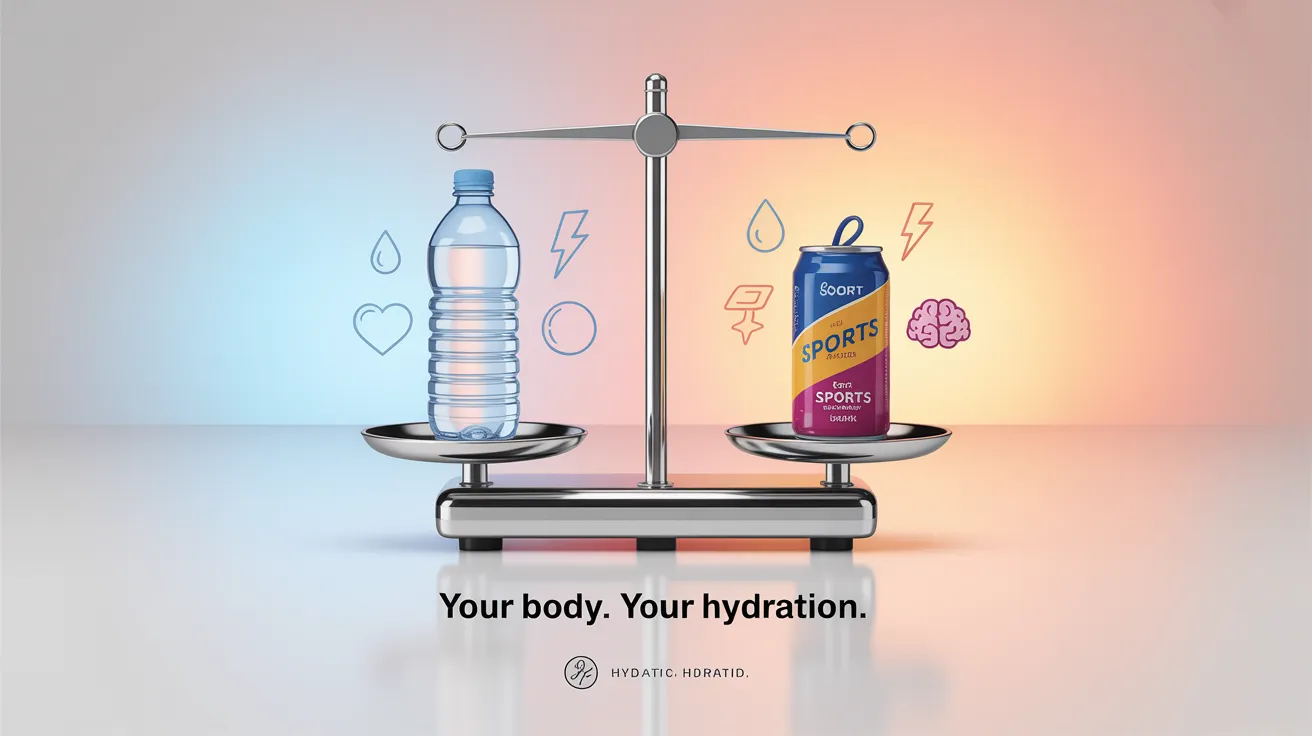
Deciding between water and sports drinks for hydration is easy once you know your body’s needs. Water is best for daily hydration because it’s calorie-free and doesn’t have added sugars.
Sports drinks are good for long workouts or activities over 60 minutes. They help replace lost electrolytes and give energy. But, watch out for the sugar in these drinks and think about making your own.
The best choice for hydration depends on your needs, how active you are, and your health goals. Knowing the difference between water and sports drinks helps you make better choices. By listening to your body and adjusting your hydration, you can stay hydrated and perform well.
👉 Stay hydrated effortlessly with this 🛒 USB-charging automatic water dispenser, perfect for home, office, or camping—simply attach it to any 5-gallon bottle for instant, spill-free water dispensing anywhere!
📌 Related Read: Electrolyte-Infused Water vs. Sports Drinks
Join the Conversation!
Drop your thoughts in the comments below and let’s chat about all things beverage!
Frequently Asked Questions (FAQ)
Water is a natural way to stay hydrated. Sports drinks have extra stuff like electrolytes and carbs. They help replace what’s lost during hard workouts.
Pick sports drinks for long workouts over 60 minutes. They’re also good for endurance events or when you sweat a lot and lose electrolytes.
For short workouts under 60 minutes, water is enough. Sports drinks are not needed unless you’re doing very intense activities.
Yes, you can make your own sports drinks. Use water, salt, and natural sweeteners. This way, you can adjust the electrolytes to fit your needs.
Drinking sports drinks every day can mean too much sugar. This might affect your weight and blood sugar. Think about your own needs and how active you are.
Dehydration signs include dry mouth, feeling tired, dizzy, and dark urine. If you notice these, drink water right away.
People with diabetes or kidney disease should talk to their doctor first. They might need to watch how much sugar or electrolytes they take in.
Yes, there are sugar-free and low-sugar sports drinks. They use artificial sweeteners or natural ones. But, know the good and bad about these choices.
Think about how active you are, how long you exercise, and what you need personally. You might also want to talk to a doctor or a dietitian for advice.



